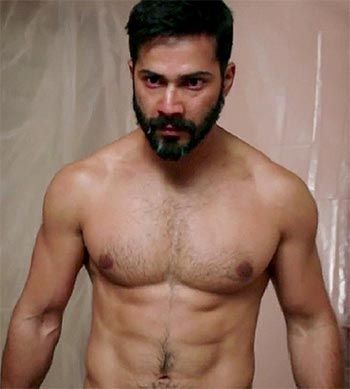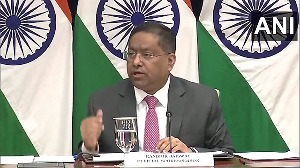 Movies, like all forms of great art, are not meant to tell us how we ought to be, but honestly document how we are, says Sreehari Nair.
Movies, like all forms of great art, are not meant to tell us how we ought to be, but honestly document how we are, says Sreehari Nair.
There is something very interesting happening in Hindi movies right now. Something that mocks at our rapidly rising tendency to make 'programmatic movies.'
By programmatic, I don't mean the usual Bollywood dance-drama-action fare, but films that tell an audience exactly what to think, when, and how.
The much-praised Queen was exactly that. A movie that pushed all the right buttons, with no density of expression, only an overlay of refinement and good taste.
On the other hand, in Badlapur and Hunterrr, we see two attempts to move away from a movie culture that has over the years only reinforced our desire to feel virtuous.
Badlapur and Hunterrr are not movies that you can call 'refreshingly free from the clutches of morality.' On the contrary, they are movies that acknowledge that our moralities are as much a function of our convenience as everything that defines us.
It is appalling to read some of the leading critics in India term Badlapur a 'revenge drama,' when it clearly shows the futility of revenge.
By the end of the movie, our loyalties change, the distinction between good and bad blurs, and we start to feel sensations that our movies have rarely allowed us to feel.
When Raghu from Badlapur stops in the middle of his dance and forces himself on Huma Qureshi's character, we know that he is not acting out of his pre-programmed moral sense or his grief, but only out of convenience.
He was aroused and he needed release. The plot, for that moment, stays on the periphery and lets the character take over.

The point about Hunterrr that many of our highbrow movie critics so badly missed is that it isn't a misogynistic movie.
It is a movie about a misogynist who uses his cockish charm and hustler-like ways to conceal the things that make him creepy.
In fact, for a misogynist, Mandar Ponkshe is surprisingly gentle and revels in giving women an illusion of power before he decides he needs to have a bit of that power himself.
And the real triumph of the movie is that all through this power-play, we know exactly how a woman feels when Mandar acts on his impulses. We feel the hurt, we feel the distaste.
The lovemaking scenes in Hunterrr aren't just men's locker room versions of women. They have a real erotic and sometimes even a lyrical pull.
It is that kind of playful sexiness that makes the movie a completely different proposition from some of the sex comedies that we are so accustomed to watching.
A leading Indian critic at a leading Web site once argued on a television show that it is necessary to create well-defined character arcs. By which she probably meant creating characters that we can learn from.
But what does all that learning amount to, except filling audiences up in an empty way?
All that jettisoning only means that we have an angle to pitch the story in our own heads, stripped of its true spirit.
Movies, like all forms of great art, are not meant to tell us how we ought to be, but honestly document how we are. They do so by enlarging our experiences, reaching out to our deepest fantasies and tickling our greyest fetishes.
When we expect our movies to be as prudish as we want to be, we are not just restricting the growth of a medium but also controlling our own fears, fancies and thoughts.











 © 2025
© 2025